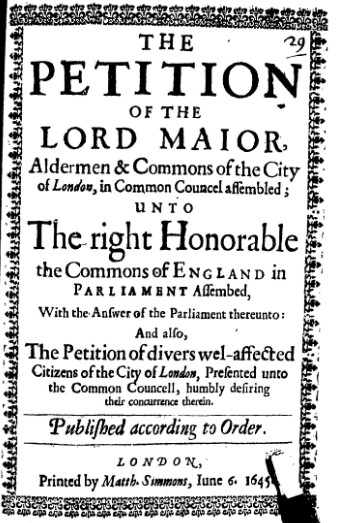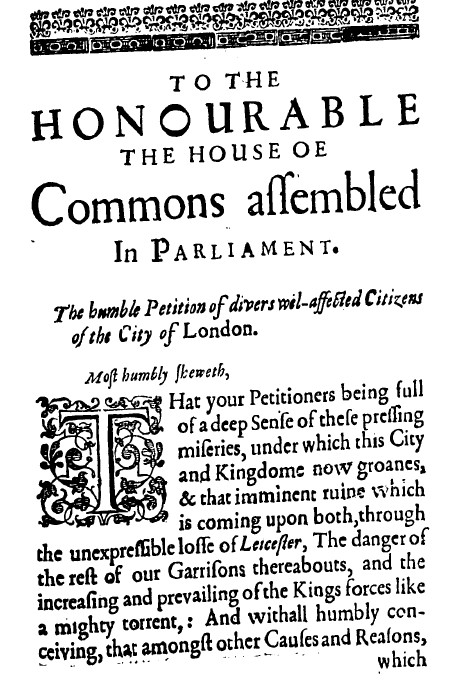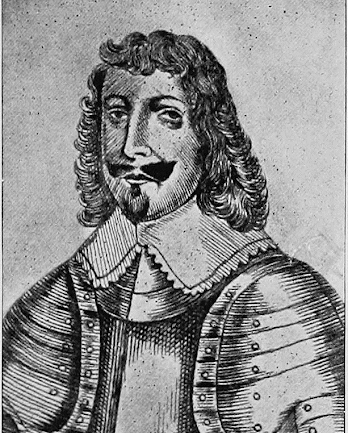[by Brendan Dooley]
London, 16 June 1645.
Salvetti writes (our emphasis):
“This city of London today is in a great uproar about the loss of the city of Leicester and the the King’s forward movement without any obstacle, blaming those who advise to engage the Parliamentary arms in the siege of the city of Oxford. They have appealed to Parliament with a Remonstrance, in which they ask for better administration of their money and therefore of the war, and in conclusion that all arms be turned against those of the King to prevent him from entering the associated provinces and thus approaching these parts, as they could easily do if they met no opposition. Parliament has immediately ordered the knight Fairfax to leave the siege of Oxford, to join other forces which are in those parts, and all together march with all haste towards the Royalists and fight them. This Remonstrance is put out by that part of the city which does not want Episcopacy, nor the newly established Presbytery, but prefers to be independent instead, not subjected to any ecclesiastical government, with every parochial government governing in its own way, and this aspect increasing every day, now shows itself plainly and the aforementioned questions are being asked, adding that when things do not progress better, there will have to be a large standing army to undertake the defense and advance their cause.”
Questa citta di Londra fa hoggi un grande strepito per la perdita della citta di Leycester et avvanzamento de’ progressi del Re \ senza nessuno ostacolo, incolpandone quelli che consigliono d’impegnare le armi Parlamentarie nell’assedio della citta di Oxonia. Sono ricorsi al Parlamento con una rimostranza, nella quale domandono miglior amministrazione del lor denaro et in conseguenza della guerra et in conclusione che tutte le armi si voltino verso quelle del Re per impedirlo che non entri nelle provincie associate et cost accostarsi a queste parti, come potrebbe facilmente fare, se non trovasse opposizione. II Parlamento ha subito ordinato al Cavaliere Farfax di lasciare l’assedio di Oxonia, di unirsi con altre forze, che sono in quelle parti, et tutte insieme marciare con ogni celerità alla volta de’ Realisti et combatterli. Questa rimostranza viene fatta da quella parte della citta che non vuole Episcopazia, ne la nuova stabilita Presbiteria, ma essere indipendente, né sottoposta a nessun governo ecclesiastico, ma si bene che ogni parochia si governi a suo modo et questa crescendo ogni giorno in numero si mostra hora a faccia scoperta et fa le domande sudette, et s’avyanza anche a dire che quando le cose non caminino meglio, saranno bastanti di havere in piedi una grossa armata per intraprendere loro istessi la difesa et avvanzamento della lor’ causa.
(M.A.P. DocId 59373)
Which “Remonstrance”? The document in question, we find, is obviously the document below, actually called “The Petition of the Lord Maior, Aldermen and Commons of the City of London,” printed in the same month of June.

The original text, summarized by Salvetti in a single sentence, is a powerfully and passionately worded plea for Parliament to take matters in hand, drawing due attention to the predicament of “the inhabitants of this city and parts adjacent” and “these pressing miseries, under which they and the whole Kingdome now groan.”
Salvetti’s interpretation, that misuse of public money is the main motive of discontent, only appears by inference; as the Petition actually begins with a lament regarding “the unexpressible losse of Leicester, the barbarous cruelty executed there, the danger of the rest of our Garrisons, and well-affected thereabouts, and the increasing and prevailing of the enemy by Sea and Land, like a mighty Torrent.”
From this Salvetti moves to pinpoint the general tenor of the following clauses, as evidencing a widespread dissatisfaction regarding the conduct of the war.
Given space considerations, Salvetti did not do a bad job!
However, reading further in the documentation (full contents below) we find additional curious elements in this dialogue between the people and the parliament that deserve attention here for how they set the scene for later events especially in the context of the army’s reversal of fortunes at the Battle of Naseby which was to occur within days, restoring confidence in the army as a force in politics as well as on the field.
The economy (say the writers) is in a shambles, with transportation interrupted and no clear word from the Parliament on the recent treaties.
They move on to the question of military recruitment, to provide Fairfax with a better army; and they urge the Parliament to see that the army takes immediate action against the Royalist adversaries.
Finally, the publication includes information on the official recording of the Petition by Parliament:
“Die Mercurii Junii 4. 1645.
“Resolved, &c.
“THAT the answer to the Petitioners shal be, That the House wil take the particulars of the Petition into serious consideration. And doe return them thankes for their good affections. And as to their desire of leave to present the like to the House of Peeres, this House leaves it to themselves, and to their own discretion.
“H. Elsing, Cler. Parl. D. Com.”
Appended to the Petition we have been discussing, and the extract from the Parliamentary minutes, we also find “To the Honorable the House of Commons Assemled in Parliament, the Humble Petition of divers wel-affected Citizens of the City of London.”

There the “divers well-affected citizens” referred back to the “unexpressible losse of Leicester, The danger of the rest of our Garrisons thereabouts, and the increasing and prevailing of the Kings forces like a mighty torrent.” Among the causes of concern is also “the not advancing of our Brethren of Scotland into these Southern parts.” Therefore, they recommend and “Most humbly pray, That Sr. Thomas Fairfax be ordered with all speed, to march with his Army towards the King.” Get ready!
RECOMMENDED READING
J. F. Hollings, History of Leicester during the Great Civil War, Leicester: Combe and Crossley, 1840
Mark Kishlansky, The Rise of the New Model Army, Cambridge U.P. 1979



